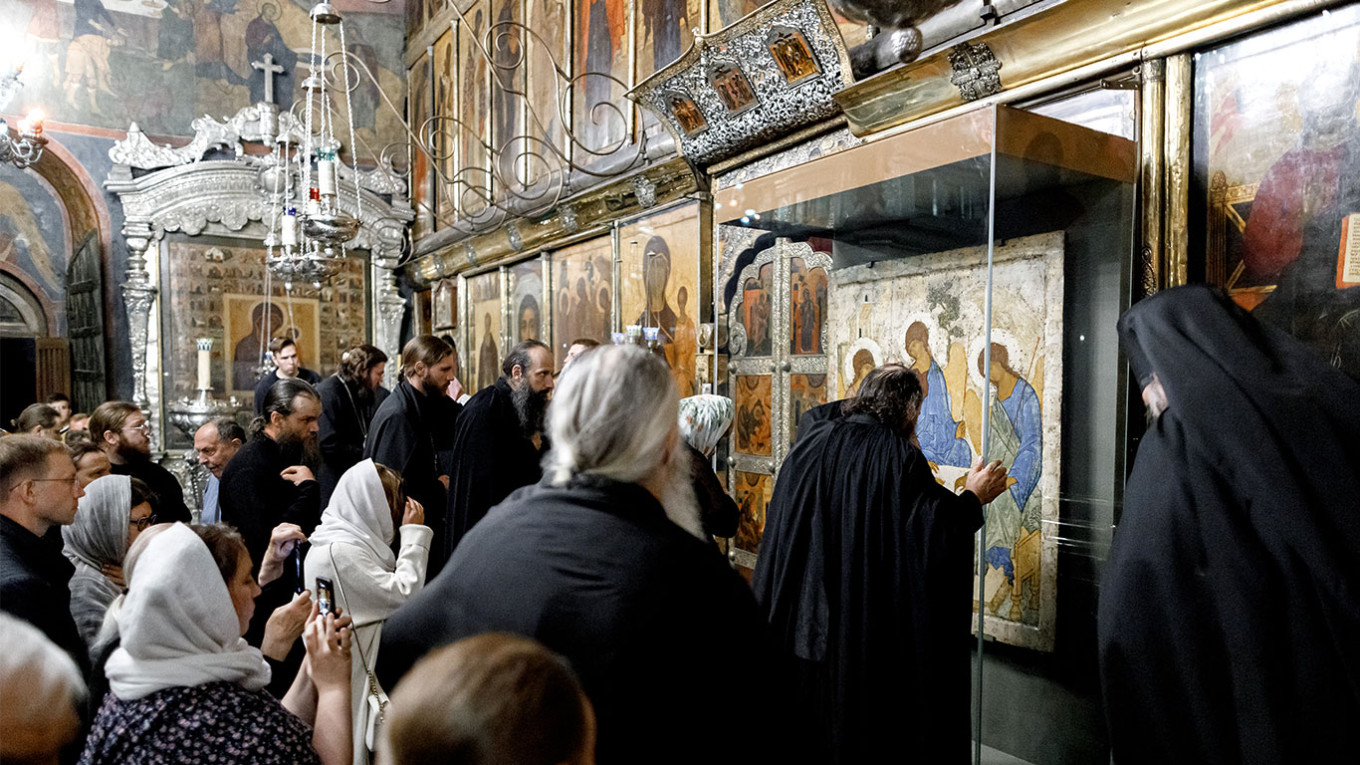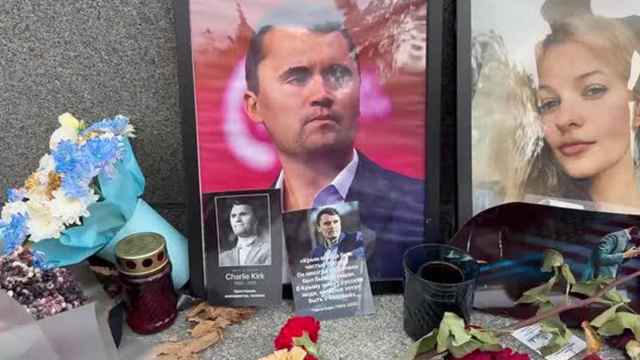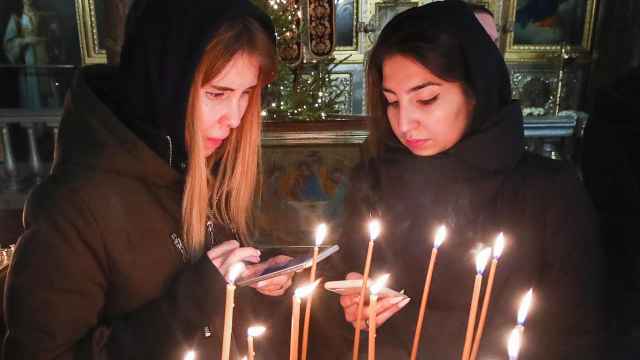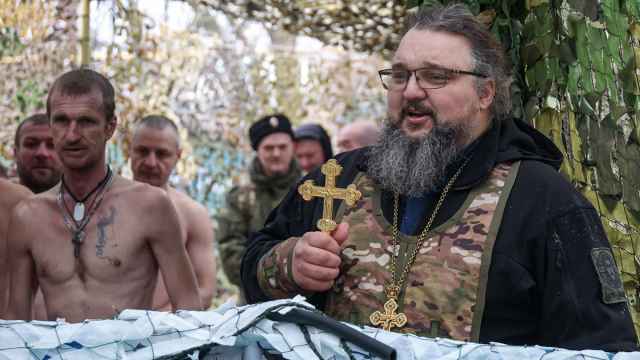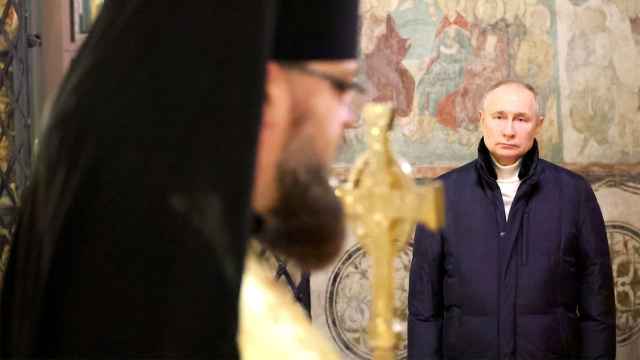For nearly a century, visitors came to Moscow's Tretyakov Gallery to admire the perfect harmony of Russia's most famous icon: the "Trinity," painted by Andrei Rublev in the Middle Ages.
The almost 600-year-old artwork depicting three angels is one of the most recognizable Russian masterpieces in the world.
Last month, however, President Vladimir Putin handed over the historic icon to the Russian Orthodox Church, the latest sign of the tightening alliance between the Kremlin and religious leaders.
The handover has sparked an outcry from restorers and art historians, who warn the extremely fragile medieval icon might not survive outside the Tretyakov Gallery's walls.
It comes as Russia's offensive in Ukraine stretches into its second year, with Patriarch Kirill throwing his support behind the assault and saying that dying in Ukraine "washes away all sins."
Lev Lifshits, one of the country's leading art historians, warned that the "Trinity" could be destroyed and said he believed the decision to give it to the church was political.
He compared its state to an ailing person.
"If you suddenly take a critically ill person out of an intensive care unit, what do you think would happen?"
Some political observers say Putin's move is a spiritual decision dictated by the difficult situation on the front line in Ukraine.
"Still no victory," said political analyst Georgy Bovt. "All that remains is for Putin to ask God for help."
With Moscow's military campaign in Ukraine stalling, Russian authorities have been increasingly willing to depict the offensive in religious terms.
The masterpiece was painted for what is now the Trinity Lavra of St. Sergius located in the town of Sergiyev Posad outside Moscow.
After the 1917 Bolshevik revolution, the Soviet authorities transferred the artwork to the Tretyakov Gallery in 1929.
The church said the icon would be first exhibited at the Christ the Saviour Cathedral in Moscow before returning to the historic monastery in Sergiyev Posad. Religious leaders insist they have every means at their disposal to preserve the precious icon.
It is the second transfer of a national treasure to the church in recent weeks.
The St. Petersburg-based Hermitage Museum said another Russian monastery would receive the silver sarcophagus of Alexander Nevsky, a medieval prince and national hero.
Hermitage director Mikhail Piotrovsky, who has lauded the Ukraine offensive, said it was the right move "at this geopolitical time."
"Today, the sacred significance of the monument is more important than its artistic value," he told reporters.
'Helped Russian princes'
In a sign the church will not tolerate dissent, Patriarch Kirill has fired and banned from the priesthood a cleric heading the Moscow Patriarchate's expert council on church art, who said that the safety of the icon was paramount.
Speaking to AFP before his dismissal, Archpriest Leonid Kalinin said the icon's "rightful place is where it was painted to be."
Standing in an ornate Moscow church, the cleric welcomed the fact that Putin, a former KGB spy, "turns to shrines in difficult and fateful moments."
By giving the icon back to the church, Putin wants to "return Russia to its core," he added.
Putin has sought to depict the offensive in Ukraine as a battle against the decadent West, and used religious symbols to rouse support.
The Kremlin said that during a rare visit to occupied southern Ukraine in April, the Russian president gave troops a copy of a historic icon.
Art historian Lifshits said the "Trinity" had helped Russian rulers in difficult times.
"Contemplating Rublev's 'Trinity' helped Russian princes overcome feuds," he said.
Popular legend has it that Josef Stalin, the ruthless dictator of the atheist Soviet Union, also sought divine help in the country's epic battle against Nazi Germany.
According to one popular myth, in a bid to save Moscow from approaching German troops in 1941, a plane carrying an icon flew over the Russian capital. Two years later Stalin met religious leaders and blessed cooperation between the church and the Soviet government.
'Unjustified risks'
Rublev's most famous work has left the Tretyakov Gallery only a handful of times, including during World War II when it was evacuated to safety.
In 2022, the icon traveled back to the Trinity Lavra of St. Sergius for religious celebrations.
Art experts said the piece suffered significant damage when it was temporarily moved.
Lilia Yevseyeva, an art historian at the Museum of Russian Icons in Moscow, said that, if the icon leaves the Tretyakov Gallery for good, "future generations will not see it in its current state."
Following the public outcry, Putin's spokesman Dmitry Peskov said the icon would be exhibited at the Christ the Savior Cathedral, where experts will decide on its future restoration.
Art experts are adamant the piece should not leave the museum.
Even members of the Russian Academy of Sciences broke their silence, saying the icon cannot be moved, "even for a short period of time."
In an open letter to the culture minister they said only a museum could ensure the preservation of Rublev's "Trinity."
"Masterpieces of Russian icon painting and national treasures should not be exposed to unjustified risks," the letter warned.
A Message from The Moscow Times:
Dear readers,
We are facing unprecedented challenges. Russia's Prosecutor General's Office has designated The Moscow Times as an "undesirable" organization, criminalizing our work and putting our staff at risk of prosecution. This follows our earlier unjust labeling as a "foreign agent."
These actions are direct attempts to silence independent journalism in Russia. The authorities claim our work "discredits the decisions of the Russian leadership." We see things differently: we strive to provide accurate, unbiased reporting on Russia.
We, the journalists of The Moscow Times, refuse to be silenced. But to continue our work, we need your help.
Your support, no matter how small, makes a world of difference. If you can, please support us monthly starting from just $2. It's quick to set up, and every contribution makes a significant impact.
By supporting The Moscow Times, you're defending open, independent journalism in the face of repression. Thank you for standing with us.
Remind me later.


